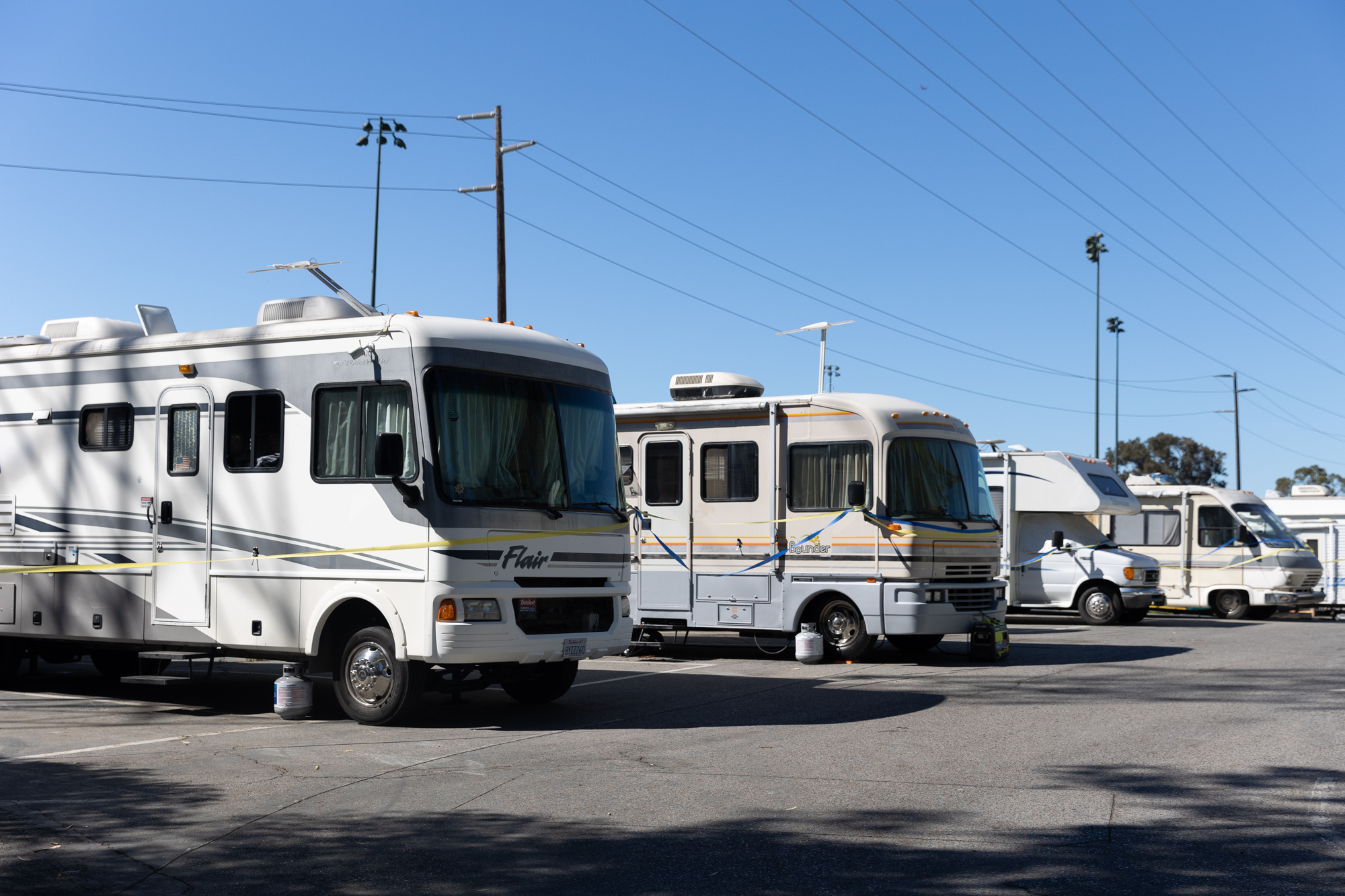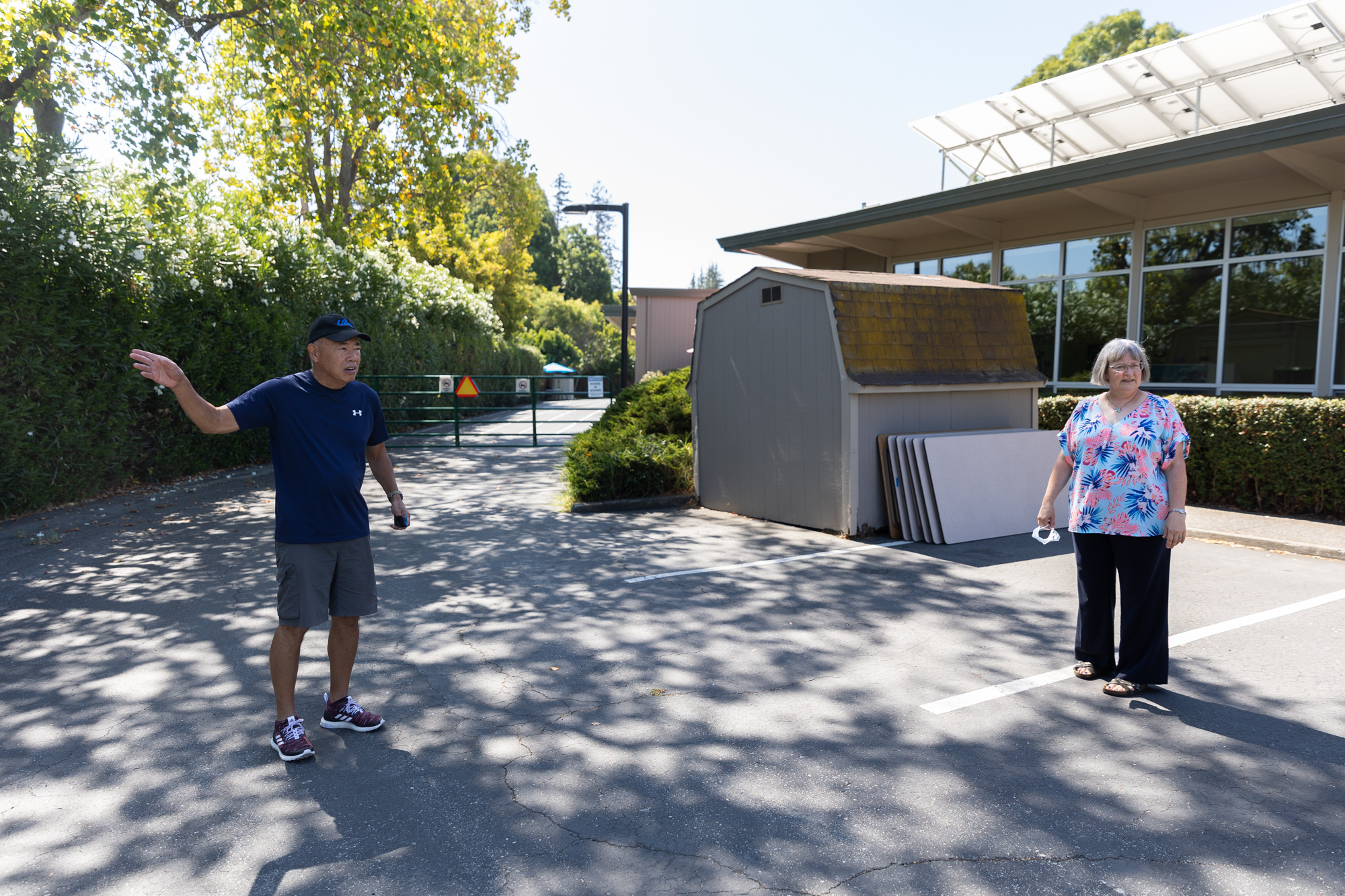Calling it a small but crucial tool for addressing homelessness, Palo Alto agreed on Monday to expand and make permanent a program that allows local congregations to devote parking spaces to vehicle dwellers.
By a 6-1 vote, with Greg Tanaka dissenting, the council made permanent the "safe parking" program that has been in place on a pilot basis since 2020. The program, which is now in effect at four local congregations, allows each congregation to designate up to four spaces to vehicle dwellers for overnight parking. The nonprofit MOVE Mountain View coordinates the program, registers participants and provides case management services for unhoused individuals.
In addition to making the church program permanent, the City Council agreed on Dec. 4 to explore a physical expansion of the only "safe parking" site on city land: a lot on 2000 Geng Road that currently accommodates up to 12 RVs.
The changes that the council approved Monday would modify the safe parking program in several key ways. Congregations would no longer have to undergo a trial period before establishing their programs on a permanent basis. And while the number of vehicles would remain capped at four when the program is established, congregations would have the option of expanding their spaces to six the following year and to eight the year after that.
In approving the "safe parking" program on the permanent basis, council members acknowledged the prevalence of the homelessness problem, both locally and around the state. Santa Clara County's point-in-time count earlier this year identified 206 unhoused individuals in Palo Alto, of whom 181 slept in vehicles. Of the 102 vehicles that served as homes, 87 were RVs, according to the count.
Council member Julie Lythcott-Haims suggested that this tally may undercount the local unhoused population. She said she has spoken to individuals who live in vehicles along El Camino Real and some have told her that they weren't included in the tally. She suggested that the city needs more data on how many vehicle dwellers there actually are in Palo Alto so that it can provide them with services such as trash and sewage disposal.
Lychcott-Haims also strongly supported expanding the Geng Road site, which is the only "safe parking" area that accommodates RVs and that allows vehicles to remain on-site throughout the day. According to city staff, this could be done by having the parking program take over adjacent land that is also owned by the city but that is currently being leased out and used for construction staging.
A report from the Department of Planning and Community Services notes that if the city were to pursue expansion of the Geng Road site, it would need to identify an alternative for construction staging and consider the financial implications.
"Financially, this includes both revenue loss from foregone rent and potentially additional expenses from the need to secure a location for construction staging for City capital projects," the report states.
The council broadly supported exploring opportunities to add more safe-parking sites. Vice Mayor Greer Stone called the decision to strengthen and make permanent the safe-parking program an "easy and obvious decision."
"For an issue as complex and costly in solving homelessness, we need all the tools in our tool chest available, and this tool clearly works," Stone said. "I think this is a common-sense solution."
For vehicle dwellers looking for permanent housing, the results have been somewhat mixed, data shows.
As of end of June, the first three congregations that have signed up for "safe parking" — Highway Community Church, the Unitarian Universalist Church of Palo Alto and First Congregational Church of Palo Alto — have collectively served 37 individuals, according to a new report from city staff (the fourth participant, Congregation Etz Chayim, just launched its program and its data was not available).
About 45% of the participants in the local safe-parking programs moved on to permanent housing, according to city data. While this suggests room for improvement, city officials noted that this is well above the countywide rate of 34% in 2023 (That itself is a huge improvement from 2022, when just 14% of the county's "safe parking" participants moved on to permanent housing.).
"We actually have a pretty good percentage of positive placement, especially when looking at it in context with the county overall," said Rachel Tanner, management specialist in the Department of Planning and Development Services.
While some of the congregation programs had encountered initial neighborhood resistance, there hadn't been any complaints from any churches or from residents near the safe parking sites, according to staff and church leaders.
In modifying the program, council members emphasized the advantages of the Geng Road site, which not only accommodates RVs but also includes amenities like showers, a kitchen, laundry facilities and a children's library. While existing rules allow RVs to park in congregation lots, MOVE Mountain View has resisted directing them to these sites, opting to place them in the more service-rich RV lots.
The demand among RV dwellers for parking spaces has been high, with some being forced to spend months on a waiting list, according to staff. But Pastor Mike Love, operations manager at MOVE Mountain View, said that while the organization isn't opposed to exploring having RVs park at congregation lots, their size makes such an arrangement less than ideal.
"There's a big difference in scale between four RVs and four cars," Love said, "There's a bunch of factors that make it a tougher pitch to the community for us."
Some council members lamented the relatively low rate of permanent placements into housing at some of the sites. The Geng Road site, for instance, which has the most services and parking spaces, saw just 13 of its 87 residents receive "positive placement," a rate of 15.5%, according to city data.
Council member Ed Lauing observed that while the "positive placement" numbers are relatively low, that may in part be a function of the many amenities that the Geng Road site provides, including showers, a kitchen and other amenities. Though officially temporary, it creates a "flavor of home" for residents, he suggested. Some may prefer to stay there.
Another factor that makes it hard to move people out of safe parking spots is the paucity of alternatives for permanent housing. Melissa McDonough, assistant to the city manager, suggested that the biggest factor that is preventing more placement of people into permanent homes is the city's housing supply shortage.
"In the end, one of the things that is a limiting factor is how long does it take for them to move through that list and how many housing options are available to them," McDonough said. "Do they have a family that can take them in? Is there an apartment that's open for them?
"Finding ways to expand our housing would help a lot with that."
The council's vote to approve the permanent establishment of safe parking comes just a month after the city celebrated a groundbreaking on another major project aimed at assisting unhoused individuals: the construction of a transitional housing complex at 1237 San Antonio Road, near the Mountain View border. The 87-apartment project, which is set to open in 2025, will be managed by the nonprofit LifeMoves. It too will have the mission of moving residents to permanent housing.
Tanaka, who opposed the LifeMoves project, also voted against expanding and making permanent the safe-parking program. He questioned whether the program, which is funded largely by the county, represents the best return of investment.
"If we expand it, is it really going to help?" Tanaka asked. "Or would it help if we do what Mountain View does and also couple it with parking enforcement, or maybe more programs to help support those who are unhoused?
"I think we all want to try to solve this problem but I think we have to think about what brings the biggest return on investment in terms of doing that."




Comments
Registered user
Another Mountain View Neighborhood
on Dec 6, 2023 at 4:48 pm
Registered user
on Dec 6, 2023 at 4:48 pm
The cities could initiate financially self-sufficient Safe Parking lots, most RV dwellers today could / should be able to afford $400 to $500 per month for safe Parking, limited space, with restrooms / showers, garbage collection, and basic security. They just can't afford the ever increasing rent $$ in our cities.
100 sites, at $500 per month = $50,000 per month, in 12 month = $ $600,000 per year.
Could hire 5 individuals to provide basic security 24/7, and cleaning restrooms / showers, and general beautification projects, and maintenance at $1000 per week per person.
5 people X 52 weeks X $1000 per week = $260,000 per year, then $600,000 - $260,000 = $340,000 left for maintenance, and some assistance if needed. If any $$ are left could be used for summer youth programs thru out the cities.
Registered user
Another Mountain View Neighborhood
on Dec 6, 2023 at 5:01 pm
Registered user
on Dec 6, 2023 at 5:01 pm
People have resorted to Urban Living, in cars, vans, motorhomes, and yes, some in tents because ever increasing rents has made renting unaffordable, unreasonable for a segment of our population. IMHO, it is unrealistic to expect that a case worker, can / will magically transition people in Urban Living to rent by increasing their income to afford those ever increasing rents in our cities. Therefore, the 'For Pay Safe Parking Lots' is smart, ditch the well intended but unrealistic consept of transition to rent.